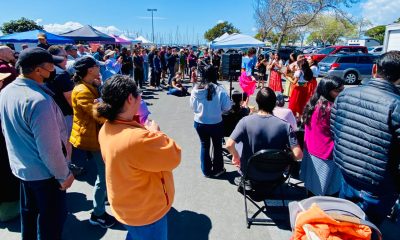Activism
Oakland Council Seeks Racial and Gender Equity in Hiring for City-Funded Construction Projects, Part III
‘I don’t see Black people working on projects in Oakland,’ was a common comment by town hall meeting participants “(And) we have to have more discussion and focus on the lack of Black presence in the development projects,” said another.

City held town hall meetings to hear experiences of local residents working in construction
By Ken Epstein
The Oakland City Council is developing policies and practices to overcome barriers that prevent the hiring of African Americans and women on building projects that are funded by taxpayer dollars.
The Council is beginning implementation of a recent report from the city’s Department of Race and Equity. The report was produced in response to a request of building trade unions for a citywide Project Labor Agreement (PLA) that would guarantee most city construction jobs to members of their unions.
The Council voted in October to create a task force to gather community expertise to adopt new policies to promote equity in city-funded construction employment. The task force has not started yet, according to City Representative Karen Boyd.
So far, 10 of 28 building trades unions have submitted data on gender, race and ethnicity of their members. Of the unions that reported, 2% of current trade union members are female and 5% are Black.
To get to the present stage has already taken several years of intensive efforts by city staff, nonprofits and community groups who wrote the city report, “Improving the Effectiveness of Project Labor Agreements.”
Some of the work that led to the final report included holding town hall meetings to hear opinions and concerns of people involved in the building industry: construction workers, representatives of the building trades unions, small contractors, and community advocates.
The town hall meetings were held between June and September 2019, sponsored by the city’s Contract and Compliance Division and the Department of Race and Equity at five different locations throughout the city. A summary of these town halls was prepared by Junious Williams Consulting.
The town halls heard first-hand what participants see as “barriers to training, employment and contracting for Oakland residents in city-involved construction projects, especially for those who live in Oakland neighborhoods (and) experience negative disparate impacts in terms of access to training and employment,” according to the summary report.
One of the major themes were concerns about the “behavior and commitment of the building trades unions.” Community members said the unions, “(h)ave not been forthcoming with data on the racial composition of their membership” and proposed that “the city should not engage in negotiating a PLA/CWA (Project Labor Agreement/Community Workforce Agreement) unless the unions are willing to change their stance around data on membership and their practices, which participants saw as barriers to employment for Black workers and other Oakland residents,” according to the summary report.
‘I don’t see Black people working on projects in Oakland,’ was a common comment by participants “(And) we have to have more discussion and focus on the lack of Black presence in the development projects,” said another.
Several people mentioned that past job-producing efforts have too often stressed entry-level jobs and not top-paying, journeyman positions. “(There is) too much focus on pre-apprentice and apprentices. (There) needs to be more focus and discussion on how to increase work for journey people.” Journey people generally have additional skills and licensing and are better paid.
Some of those attending the meetings were concerned that the building trades unions function as a closed club. “The union behavior sounds like you are saying ‘I can set up a fraternity and only the people I say yes to can join.’ This should be enough to say no to a PLA,” said one speaker.
Past agreements have required certain percentages of Oakland residents to be hired on jobs, but contractors have often sidestepped the rule. “Some people complained that contractors have rented apartments near their project sites to bring in non-resident workers who are counted as Oakland residents for compliance purposes,” the summary report said.
Participants also discussed the barriers for small contractors, who are often non-union but employ the overwhelming majority of Black and women workers who obtain jobs in construction.
Barriers facing small contractors include obstacles to obtaining performance bonds, insurance and access to capital. The city needs to have “carve outs for small, non-union contracts,” which includes breaking up the scope of work to be manageable for smaller companies (and to) unbundle contracts to make them accessible to smaller companies,” the summary report said.
One of the most consistent comments was that strong policies would not be enough; the city must match the policies with strong monitoring and enforcement of any labor agreements.
“Whatever agreement (there is) must have strong teeth (sufficient staff) to deal with companies that do not follow the rules,” the summary report said.
This is the third of a series of articles on Project Labor Agreements and racial equity analysis.
Activism
Oakland Post: Week of April 24 – 30, 2024
The printed Weekly Edition of the Oakland Post: Week of April 24 – 30, 2024

To enlarge your view of this issue, use the slider, magnifying glass icon or full page icon in the lower right corner of the browser window. ![]()
Activism
Oakland Post: Week of April 17 – 23, 2024
The printed Weekly Edition of the Oakland Post: Week of April 17 – 23, 2024

To enlarge your view of this issue, use the slider, magnifying glass icon or full page icon in the lower right corner of the browser window. ![]()
Activism
Oakland Schools Honor Fred Korematsu Day of Civil Liberties
Every Jan. 30, OUSD commemorates the legacy of Fred Korematsu, an Oakland native, a Castlemont High School graduate, and a national symbol of resistance, resilience, and justice. His defiant stand against racial injustice and his unwavering commitment to civil rights continue to inspire the local community and the nation. Tuesday was “Fred Korematsu Day of Civil Liberties and the Constitution” in the state of California and a growing number of states across the country.

By Post Staff
Every Jan. 30, OUSD commemorates the legacy of Fred Korematsu, an Oakland native, a Castlemont High School graduate, and a national symbol of resistance, resilience, and justice.
His defiant stand against racial injustice and his unwavering commitment to civil rights continue to inspire the local community and the nation. Tuesday was “Fred Korematsu Day of Civil Liberties and the Constitution” in the state of California and a growing number of states across the country.
One OUSD school is named in his honor: Fred T. Korematsu Discovery Academy (KDA) elementary in East Oakland.
Several years ago, founding KDA Principal Charles Wilson, in a video interview with anti-hate organization “Not In Our Town,” said, “We chose the name Fred Korematsu because we really felt like the attributes that he showed in his work are things that the children need to learn … that common people can stand up and make differences in a large number of people’s lives.”
Fred Korematsu was born in Oakland on Jan. 30, 1919. His parents ran a floral nursery business, and his upbringing in Oakland shaped his worldview. His belief in the importance of standing up for your rights and the rights of others, regardless of race or background, was the foundation for his activism against racial prejudice and for the rights of Japanese Americans during World War II.
At the start of the war, Korematsu was turned away from enlisting in the National Guard and the Coast Guard because of his race. He trained as a welder, working at the docks in Oakland, but was fired after the bombing of Pearl Harbor in 1941. Fear and prejudice led to federal Executive Order 9066, which forced more than 120,000 Japanese Americans out of their homes and neighborhoods and into remote internment camps.
The 23-year-old Korematsu resisted the order. He underwent cosmetic surgery and assumed a false identity, choosing freedom over unjust imprisonment. His later arrest and conviction sparked a legal battle that would challenge the foundation of civil liberties in America.
Korematsu’s fight culminated in the Supreme Court’s initial ruling against him in 1944. He spent years in a Utah internment camp with his family, followed by time living in Salt Lake City where he was dogged by racism.
In 1976, President Gerald Ford overturned Executive Order 9066. Seven years later, the 9th Circuit Court of Appeals in San Francisco vacated Korematsu’s conviction. He said in court, “I would like to see the government admit that they were wrong and do something about it so this will never happen again to any American citizen of any race, creed, or color.”
Korematsu’s dedication and determination established him as a national icon of civil rights and social justice. He advocated for justice with Rosa Parks. In 1998, President Bill Clinton gave him the Presidential Medal of Freedom saying, “In the long history of our country’s constant search for justice, some names of ordinary citizens stand for millions of souls … To that distinguished list, today we add the name of Fred Korematsu.”
After Sept. 11, 2001, Korematsu spoke out against hatred and discrimination, saying what happened to Japanese Americans should not happen to people of Middle Eastern descent.
Korematsu’s roots in Oakland and his education in OUSD are a source of great pride for the city, according to the school district. His most famous quote, which is on the Korematsu elementary school mural, is as relevant now as ever, “If you have the feeling that something is wrong, don’t be afraid to speak up.”
-

 Community2 weeks ago
Community2 weeks agoFinancial Assistance Bill for Descendants of Enslaved Persons to Help Them Purchase, Own, or Maintain a Home
-

 Activism3 weeks ago
Activism3 weeks agoOakland Post: Week of April 3 – 6, 2024
-

 Business2 weeks ago
Business2 weeks agoV.P. Kamala Harris: Americans With Criminal Records Will Soon Be Eligible for SBA Loans
-

 Community2 weeks ago
Community2 weeks agoAG Bonta Says Oakland School Leaders Should Comply with State Laws to Avoid ‘Disparate Harm’ When Closing or Merging Schools
-

 Activism2 weeks ago
Activism2 weeks agoOakland Post: Week of April 10 – 16, 2024
-

 Community1 week ago
Community1 week agoOakland WNBA Player to be Inducted Into Hall of Fame
-

 Community1 week ago
Community1 week agoRichmond Nonprofit Helps Ex-Felons Get Back on Their Feet
-

 Community2 weeks ago
Community2 weeks agoThe Year Ahead: Assembly Speaker Rivas Discusses Priorities, Problems






















































